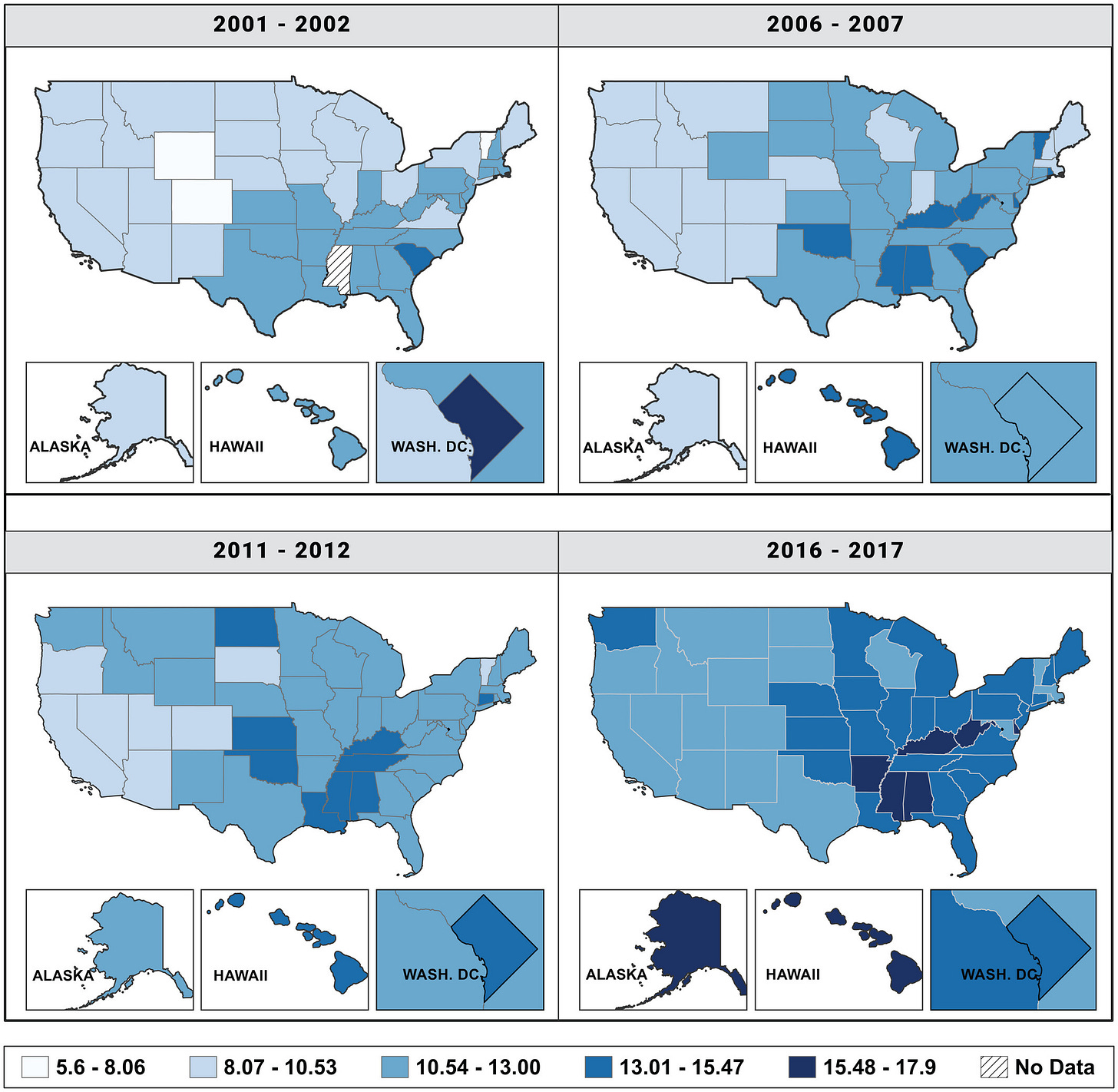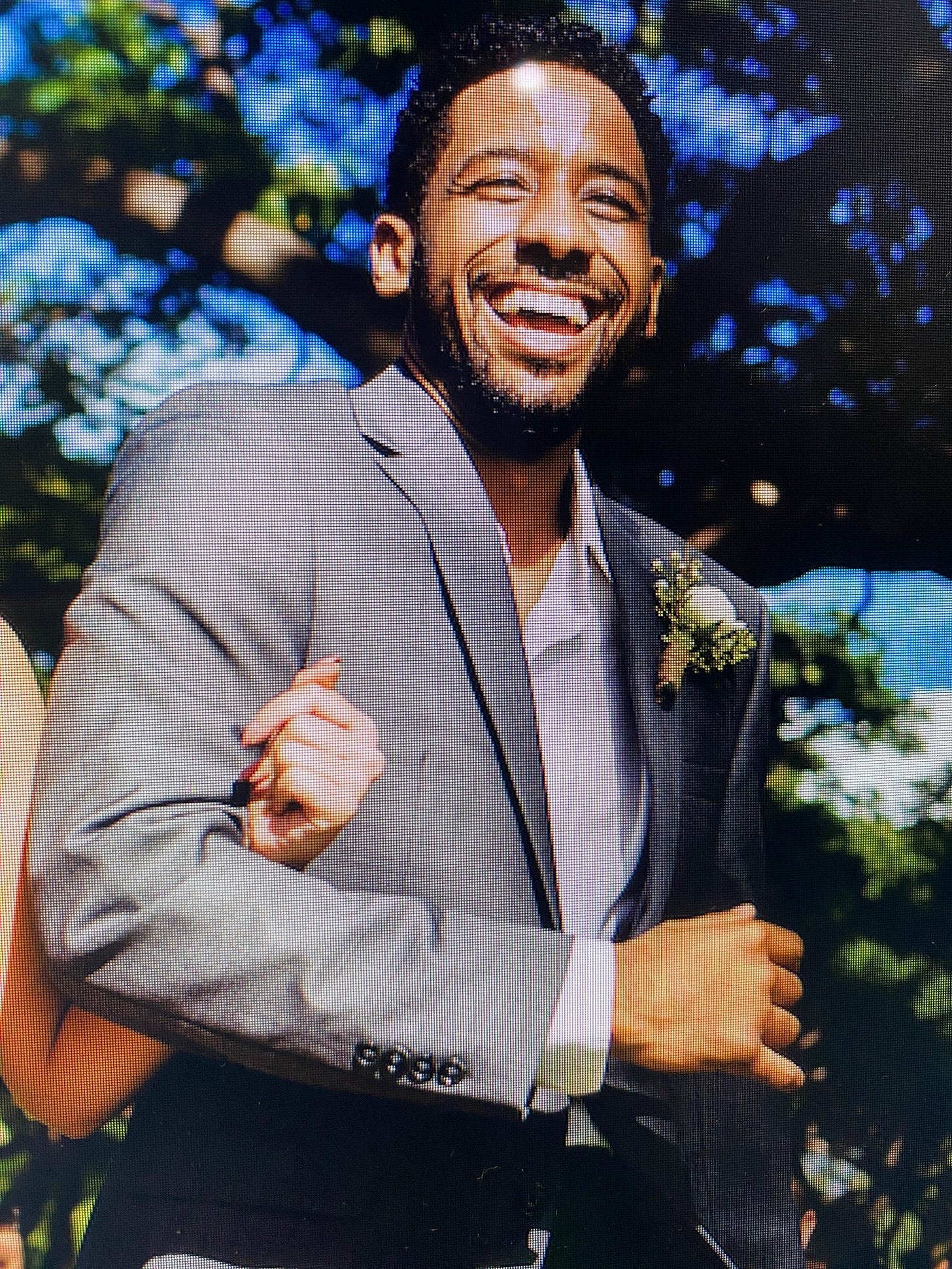How young is 'too young' for cancer screening?
Rates of rectal cancer are rising in young people. Earlier screening could save lives so why don't we do it?
Hello everyone.
As many of you may know cases of colorectal cancer in adults under 50 are increasing. Individuals born in 1990 have double the risk of colon cancer and 4x the risk of rectal cancer than people born in 1950. Further, young people can have symptoms for up to 2 years before being diagnosed leading to more advanced (less curable) cancers.
These trends led the U.S. Preventive Task Force to lower the starting age for colorectal cancer screening from 50 to 45. This was a good step but is it enough?
For this week’s newsletter, I want to introduce you to Michael Frierson. I met Michael on Instagram (@mikefri4) after he commented on my post about my first colonoscopy. He shared his very personal story and thanked me for sharing mine.
Michael is a passionate advocate for early screening for colorectal cancer. It’s the great passion of his life since losing his son to colon cancer at the age of 38. I invited Michael to share his journey to advocacy and encourage you to follow him on Instagram for more.
So why does a person become an advocate for young onset colorectal cancer (YO-CRC)?
My son Michael was diagnosed with Stage 3 Colon Cancer in 2016. Because of the number of polyps found in his colon, doctors removed his entire colon and created an ostomy, which allowed him to defecate into a bag taped to his abdomen.
After surgery, he went through about seven months of chemotherapy and radiation therapy and the doctors told us that he was NED (no evidence of disease) in 2017. In 2018, his small intestine was surgically attached to his rectum which made it possible for him to defecate normally.
In 2019, Michael was experiencing a problem with his stomach; he was not defecating. The surgeons thought this was due to a kink in his small intestine which would be easily fixed with another surgical procedure, one that would last only 1.5 hours. Once the surgery began, however, our greatest fear became a reality. Michael’s cancer had returned.
Michael had gone from being NED to Stage 4 colorectal cancer (meaning that the cancer had metastasized to other organs). The surgery that was supposed to take 1.5 hours took 8.5 hours and required removal of his rectum, anus and several tumors in spaces surrounding those areas. One tumor had wrapped around the base of his spine and could not be removed. Michael was now living with Cancer. And since Michael no longer had a colon, anus, or rectum, the ostomy was back.
In early December 2020, Michael went back into the hospital when his stoma had stopped working; he was no longer able to defecate. His doctors again hoped that it was just a kink in his small intestine, and it would correct itself after a nasogastric tube was placed to drain the fluid from his stomach.
After two weeks in the hospital with no improvement, all of his physicians were sure that a cancerous tumor was blocking his small intestine.
This was the first time in the 5 years of him fighting this fight that I could see his hope fade. That was the first time I realized we had lost the fight. I had a long conversation with his wife and his mom about options and the best way to get him out of the hospital.
After a discussion with Zuri Murrell MD (Colorectal Surgeon) and Shirley Paski MD (Gastroenterologist), a decision was made that would allow Michael to live his remaining days at home. A gastrostomy tube (G-Tube) was inserted directly into his stomach to eliminate stomach acid build up. The G-Tube would be essentially bypassing his small intestine. This also meant, he would never be able to eat solid foods again. He would live the remaining time of his receiving his nutrition through his port-a-cath with TPN (Total Parenteral Nutrition). The tumor would also cause problems with his bladder, which would lead to him having tubes inserted into his kidneys. No longer would he urinate like a normal person.
Michael was a foodie, so needless to say, not being able to eat was just another devastating blow. But that’s what colorectal cancer does.
It systematically takes away all of the things you love to do. Your ability to eat, your ability to taste, your ability to walk, your ability to go to the bathroom like a healthy person, your ability to be intimate, your ability to breathe.
Michael and I spent the entire month of December in the hospital (along with his wife and his mom). He was released two days before New Years 2021. He passed November 4, 2021. He was 38 years old.
I am an advocate because Michael’s story is becoming a typical story (young people under the age of 45 contracting colorectal cancer) and I believe we can do better. We need to take a more progressive and aggressive approach to prevent young people from contracting colorectal cancer.
The private conversations I have with healthcare professionals regarding the increase of young people (age 21-45) contracting this type of cancer, needs to become a public conversation. Early screening via a colonoscopy, in my opinion, is the key and here’s why.
We know that risk factors for colorectal cancer like processed foods, obesity, lack of exercise and lack of vitamin D are not going away. But we also know that early detection and removal of polyps can prevent 90% of all colorectal cancers. Young people who have these risk factors or others should not have to die from colorectal cancer because they cannot access screening tests like a colonoscopy.
People often comment about my commitment to being an activist for this cause. The main comment is “It’s wonderful that you are doing this for Michael.” That’s not the case, I am not doing this for Michael. I couldn’t save my son, so I am not doing this for him. I would have been okay with not being involved with this and moving on with my life. However, during the latter days with Michael, I was challenging him to try and beat cancer. He requested/challenged me to do something to prevent this from happening to other young people.
There are 140 million people in the United States between the age of 18-45 years old. To this age group I stress, you are the driving factor that moves this country forward.
You are the largest consumer group.
You drive our economy and the stock market.
You are the main reason for our technology advancement.
You are the majority of the essential workforce. Where would Amazon, Google, Apple, Ford, Starbucks etc. be without you.
You make up 90% of our Military. You are 100% of the people who defend our country. You fight all of the wars.
You are the only group that grows the population. If not for you mankind would become extinct.
But you are the most underserved when it comes to healthcare. You can give your life fighting for your country at age 18, but you do not qualify to get a colonoscopy.

When I ask healthcare professionals why people between the age of 21-45 cannot choose to have a screening colonoscopy, these are the reasons I hear:
Colorectal cancer is a disease of the elderly.
If young people started requesting colonoscopies it would overwhelm the system.
The data does not support doing colonoscopies on people younger than 45.
The above statements frighten me as I know that colorectal cancer is predicted to be the number one cause of cancer related death of young people by 2030. That means people have precancerous polyps that we can catch now! And overtaxing the system? Sounds like we need a new system if the answer is to sacrifice our young people. If you don’t have data, then let’s get it. A study of young people would show us exactly where we are with this population and their propensity to develop pre-cancerous polyps.
I believe we can eradicate 90% of colorectal cancer in 10-15 years. The simple solution is early screening via a colonoscopy for the 21-45 age group.
This month, my goal is to raise enough money to provide free colonoscopies and removal of polyps for 58,000 to 85,000 young people between the ages of 21-45. With the permission of the participants, the data received from the colonoscopies will anonymously be placed into a database, so that we can have more current and accurate information on where we stand in the United States with colon polyps, and colorectal cancer with our younger population.
Physicians and researchers that deal with colorectal cancer regularly, know that it is 90% preventable. Early detection of polyps via a colonoscopy is the key. We as a collective can change the healthcare system as it pertains to Colorectal Cancer. I believe the 168,000 people who were diagnosed in 2022 and the 58,000 people who died would agree.
Allowing young people between the age of 21-45 the choice to get a screening colonoscopy is the clinically correct thing to do. It is the economically correct thing to do. It is the morally correct thing to do. It is the right thing to do.
Please share this with everyone you know and implore them to share it with everyone they know. Being involved with this could save your life or the life of someone you love.










These stories are so heartbreaking. Mr Frierson is turning it into something positive in the hopes of saving other lives. And it will no doubt.❤️
Yes, but even if you eliminate bowel cancer - and there's no evidence that colonoscopy lengthens people's lives to date - it has minimal impact on all cause mortality. That's what I care about. There's no RCT data that supports colonoscopy as a life extension intervention, and even if we eliminated all bowel cancer, it would have minimal impact on my life expectancy. Put your efforts into treating people who actually are sick, not into manufacturing patients out of healthy people.